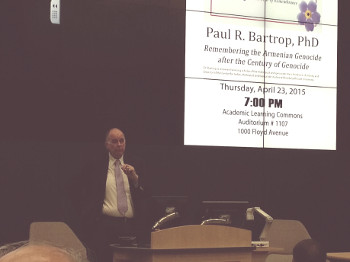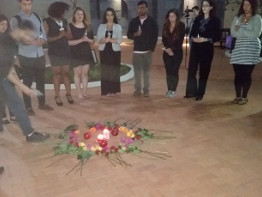DR. BARTROP, “REMEMBERING THE ARMENIAN GENOCIDE AFTER THE CENTURY OF GENOCIDE”
May 19, 2015Richmond, VA – On April 23rd, 2015 in a large lecture hall at Virginia Commonwealth University (VCU), Political Science professor Dr. Mayda Topoushian introduced internationally known residential genocide scholar Dr. Herbert Hirsch, who in turn introduced the visiting award-winning scholar of holocaust and genocide studies, Dr. Paul Bartrop. As director of the Center for Judaic, Holocaust and Genocide Studies at Florida Gulf Coast University, Dr. Bartrop, originally from Australia where he taught genocide studies and history at several universities, was conferred in 2008 with the title “Friend of the Armenian Community” by the Armenian National Committee of Melbourne Australia. He has earned several international awards for his work in Jewish and Genocide Studies. His lecture wove together the ultimate purpose of the first four events achieved by the Armenian Genocide Committee of Central Virginia- and tonight in collaboration with VCU- to achieve genocide awareness for the general public, VCU students, and the Richmond Armenian community.
“Armenian genocide is as relevant today as it was in the Twentieth Century, “ said Dr. Bartrop. “Why bother to remember these horrible events? Because they are still going on. The Armenian Genocide began in 1915, the Jewish Holocaust in 1942, Biafra in the 1970s, and in more recent times, Cambodia, Bosnia, Rwanda, Darfur, Burundi. Today there are ongoing conflicts resulting in unresolved genocides in Syria, Congo, and the Central African Republic. Intolerance is still with us.”
“Genocide is a criminal act: not a theory, an idea, but a criminal act, subject to legal sanction due to its criminal nature. In 1948 the notion of genocide was criminalized by the United Nations.” [However, the United Nations was created to stop wars; not genocides.] “Genocide is also a human activity- a man-made catastrophe. It is a worse disaster than war. It speaks of human ambitions. Genocide ultimately addresses the question of how people perceive each other – superior, vibrant, perfect- so that the ‘surplus humans’ had to be sacrificed. Massive numbers of people died. Every day during the Armenian genocide, an average of 5,000 people died. For years, the boundaries of human civilization and destruction would never be the same.”
“A genocide of that magnitude does not come out of thin air. Planning is required to create the genocide and violence must be achieved, but always in a series of steps, not immediately. A systematic process was established: first, a policy of identifying the Armenians victims, then alienating them from their daily routines of work and life. Isolation was then created of whole communities, separating out the intellectuals and the military, leading to social and individual depression, and finally, removal of the groups for ‘extermination, annihilation, and destruction,” as described by the United Nations description of the genocide.
“All these steps and measures taken stemmed from the violent perpetration of the group of victims, so great and so irreconcilable that the only way out is total destruction.”
“The Ottoman Genocide was the first large-scale genocide. Human beings were targeted due to their very existence, by the forces of the Ottoman state acting together as one. Greeks and Assyrians were also massacred along with the Armenians. All three groups were subject to atrocities. They were victims of heat, starvation and exposure, and victims of murder and mass murders.”
“The issues that penetrate to the core of any genocide: the perpetrators’ mindset: their intent, motives, justifications, war crimes and defenses, and the finally – denial. Over time, all these issues were glazed over as ‘the forgotten genocide.’ That term penetrates in people’s minds. History helped also to glaze over the facts for so many years. Why? Because one of the reasons we don’t talk much about World War I is because there was a World War II. The Armenian Genocide was eclipsed by other events of the Twentieth Century.”
However, the development of mass media in the last 65 years also revealed the truth of what happened at the beginning of World War I.
“The Armenian Genocide is now known all over the world. The Armenian Genocide is no longer forgotten. In fact, all over the world, after witnessing the huge displays of remembrance in major cities and national remembrances, people are asking, ‘Why didn’t we know about this before?’ Many are shocked by the history that escaped them during their school years. Many of the past genocides have had this problem for years after the atrocities took place. Genocide is not just a breach of history where only scholars speak to other scholars,” said Bartrop.
“In all cases of genocide there is a human activity slowly taking place, committed by evil people. Evil people focus their energies toward evil acts more than good people toward good. Yet people can stop this human activity. Genocide is never inevitable.”
“How do we change the world? Change a corner of it.”
“In 1948 when Rafael Lemkin, a Polish Jewish human rights lawyer coined the term ‘Genocide,” it established Genocide as a legal concept and it was documented as an international crime at the United Nations. But terming it does not stop it.”
“The only way to stop genocide is to encourage democracy. Because genocide is against self- interest in a democracy. That is why a new field- Genocide Studies- was born. In the hopes of educating a democratic mass of the public. Countries who deny perpetrating genocides, such as Turkey, through education of its own people, will no longer be able to claim the facts as untrue, non-existent. There is nothing innocent behind motives of a general denial. Denial is not a part of a legitimate quest for understanding. To see it in a different concept, denial is an attempt to state that horrible experiences did not take place at all.”
“There have been five forms of Turkish Denial: The destruction of Armenians never happened; Armenians were traitors to Russia; Turkey is not responsible; there was no intent to destroy Armenians; and finally, any deaths that did occur, more Turks died than Armenians. Thus, Denial is the Turkish state policy. It is the worst expression of humanity.”
“Compare their lack of complicity to Germany’s: It is a crime in Germany to deny the Jewish Holocaust.”
“Our generations have lived through the Age of Genocide. The Jewish Holocaust in our generation of the 1940s was not the first. In Russia and the Ukraine, the Gulags occurred in the 1930s, Southwest Africa, Namibia, Cambodia, Darfur, Rwanda, etc. etc.- Despite the global cry of ‘Never Again!’- Professor Hirsch calls the social amnesia over current genocides ‘Compassion Fatigue.’ ”
How do we combat this? We must educate ourselves and others.
“Take careful notes of groups of who displays intolerance to others and combat bigotry. The seeds of hatred start there. Democracy will be vulnerable if we forget that citizens can lose hope for the future- which is a developing global theme. People seek simple solutions to complex questions. This reduces a potentially devastating threat to only a single viewpoint. Be careful what you read and who you believe when they discuss hatred toward others. Every ethnic slur is an example of this. Read ‘letters to the editor’ denying the Armenian genocide and others. This is an admission of ignorance. This is what happens when humanity can be chipped away at the cost of denying the truth. Genocide can happen again.”
“We must set our personal priorities. It is in our best interests to never forget. If we look away, we risk our democracy, our human dignity, and our own destiny. As an educator, I detest dishonesty and deception and I seek to combat it.”
“Pope Francis’ remarks, recognizing and memorializing the Armenian Genocide is all to the good. With that in mind, with the spirit of the evening, and to the spirit of the Pope and to governments, call upon the United States Congress to stand up to those who oppose the truth and try to tell us what to think.”
“I have one appeal tonight: I call upon President Barack Obama to face reality. To call the tragic historical event by its name: Genocide. On this night of solemn remembrance, to face the question of honor will be a sign of moral strength. For those who speak the truth will endure. Look to their legacy. Victims have been removed by society. We will remember them unless we forget.”
“As recent as 1999, NATO anticipated that if things continued the way they were in Kosovo, there would be ‘ethnic cleansing.’ President Clinton and Prime Minister Blair sent in troops. “
In Kassab and other villages in Syria today, thousands of Armenians and other Christians have perished- and are still dying. President Obama has used U.S. Delta Forces to kill members of Isis.
“The best prevention against genocide is to plan against it: to plot the possibilities of various scenarios. This might not be the best prevention solution. Prevention is a long- term generational strategy through education. The study of history is important to develop an historical consciousness, to think things through.
A student asked, “What would it take for Turkey to recognize the Armenian Genocide?”
“It might take generations of education for this decision to become a reality, and leverage, such as accession to the European Union upon acknowledging it.”
“On the other hand, the Jewish term, Dafka – ‘in spite of what you say’- might also apply to Turkey and they still might not do it.”
Education, and developing critical thinking skills in generations of our population should be learned. This is the line of first defense. Bartrop claims it is his contribution to the future.
Yet, Bartrop says that there is hope. Through education, establishing Genocide Studies in universities, and teaching critical thinking skills, generations will evolve to seek the truth. Dr. Bartrop held up Australia as an example. In 1948, Australia was the first to sign the UN Genocide Convention and to ratify its policies against genocide within their own country in 1949. They committed themselves to prevent Genocide.
Dr. Bartrop concluded his remarks by mentioning that we must share educational opportunities with our youth to give a measure of hope to succeeding generations. Teach them ethics, morality, and critical thinking skills. They are continually bombarded with simplistic mindless entertainment. He worries about this.
“There is absolutely a dulling of the human mind taking place.”
Yet, from that same generation, he applauds the efforts of Kim Kardashian, who traveled to Armenia to honor the Genocide on behalf of her late father and his family. “She has brought Armenia to the eyes and hearts of millions of people worldwide because of who she is.”
Candlelight Vigil
A candlelight vigil took place immediately after the talk, led by the Armenian students of VCU. Professors Bartrop, Hirsch, and Dr. Mayda Topoushian each held a lit candle while the Lord’s Prayer [Hayr Mer] was recited in Armenian by the VCU Armenian students, members of the Richmond Genocide Commemoration Committee, ANCA, and other visitors. This quiet vigil ended the night of remembrance. They held a candle’s light to brighten their path to meet their goals of peace and recognition for the future.
####

